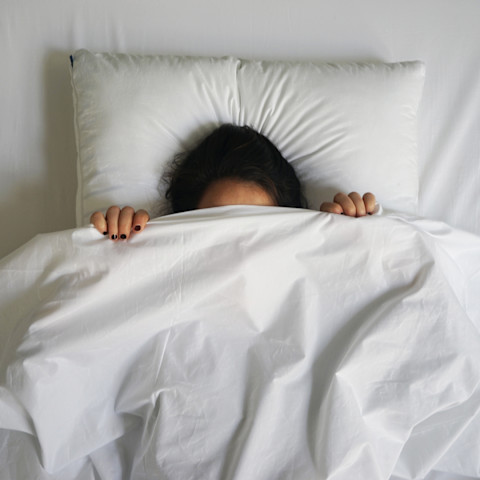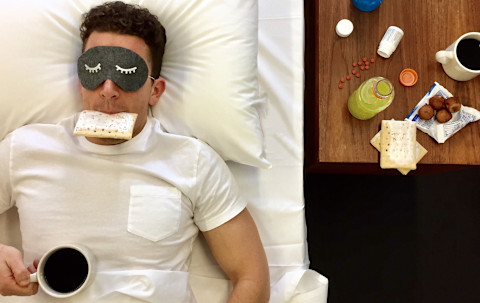
Try as they might, more than one in three Americans don't get the recommended seven hours of sleep a night. Oftentimes, those who fall into this category feel resigned to days marked by intense moodiness, mental fog, and coffee breaks.
Keeping a sleep diary is an effective way to get to the root of your fatigue. By answering a simple formula of questions and prompts, people can more clearly assess the lifestyle factors that may be helping or hindering their sleep.
Get started by setting aside five minutes in the morning and five at night for this sleep-expert-approved journaling exercise.
Ask the right questions (a.m.).
1. What time did you get into to bed last night? How long did it take you to fall asleep?
Upon waking, jot down what time you got into bed the night before and estimate how long it took you to fall sleep. Whenever possible, Dr. Ellen Vora, a psychiatrist and sleep expert, recommends climbing into bed earlier to avoid late-night rushes of energy. "I find a lot of my patients suffer from 'overtired'—that is, they go to bed too late, and their body has gone into a second wind of energy," she says. "When they climb into bed early, like around 9:30 to 10:30 p.m., they find it much easier to fall asleep and stay asleep."

2. How many times did you wake up throughout the night?
Though waking up for a minute or so throughout the night is a natural part of the sleep cycle, staying awake for long periods of time is not. Be sure to jot down a note if you found yourself lying awake for 20 minutes or more, or if you're woken up several times throughout the night (we're talking four or more).
Midnight restlessness could also be a sign of a poor sleep environment, so use it as an opportunity to take a good look around your bedroom. Is it too noisy? Is a stiff bed leaving you with aches and pains? Write it down, and experiment with new items: invest in a high-quality mattress (like those from Casper) or purchase an essential-oil diffuser to lull you to sleep with the smell of lavender.
3. What time did you wake up for good?
Oftentimes, there are discrepancies between how much sleep we think we get and how much we actually get. Recording sleeping and waking times every day will clear up the confusion and give you a better idea of how many hours you're really clocking.
Take a reflective look at your day (p.m.).
1. Did you feel like you needed caffeine upon waking? How many caffeinated drinks did you consume over the course of the day?
Track what (and when) you drink, and how it affects you come nighttime. Try experimenting with drinking—gasp—less coffee for a few days, and make note of how this alters your sleep.

2. What did you eat for dinner? How long before bed did you stop eating?
Just like your sleep quality can influence your diet, your food choices can affect your sleep in a huge way. Most experts agree that you should eat your last meal two to three hours before bed, and limit your intake of sugar, carbs, and spicy foods close to bedtime. If you're a snacker, reach for lighter noshes that contain calming tryptophan, such as chickpeas, almonds, and walnuts.
3. Did you look at a screen in the last hour before bed?
Be sure to note if you're scrolling through Instagram or catching up on Gilmore Girls right before bed. LED lights interrupt our circadian rhythms, so try to keep the phone, computer, and TV time to a minimum. Another great option if you can’t give up the screen time completely is to use blue-light-blocking technology. Most iPhones now come with a "night mode," you can download color-warming software for computers, and they even make blue-light-blocking glasses for the true fanatics.
4. What are two things you feel grateful for right now?
A sense of gratitude can profoundly influence your mental and physical health, so be sure to end every sleep diary entry with an acknowledgment of the beautiful moments that left a smile on your face that day—even the seemingly silly or small ones. According to Dr. Eva Selhub, a physician and lecturer at Harvard Medical School, "One is more likely to get better sleep when they are in a state of appreciation and positivity versus worry." Even expressing gratitude for the comfortable and supportive mattress beneath you and the soft, clean sheets touching your skin will help you stay present and appreciative.

Play sleep detective.
As each week comes to a close, review the last seven days of your journal, looking for any noticeable trends. Maybe you don't get as many hours of sleep on the nights when you go to the gym, or maybe you toss and turn less if you eat dinner earlier. Once you nail down these connections, test your theories the next week by making small shifts in your routine that you suspect will promote deep, restful sleep. By the time a month goes by, you'll be more aware—and likely more rested, too.
